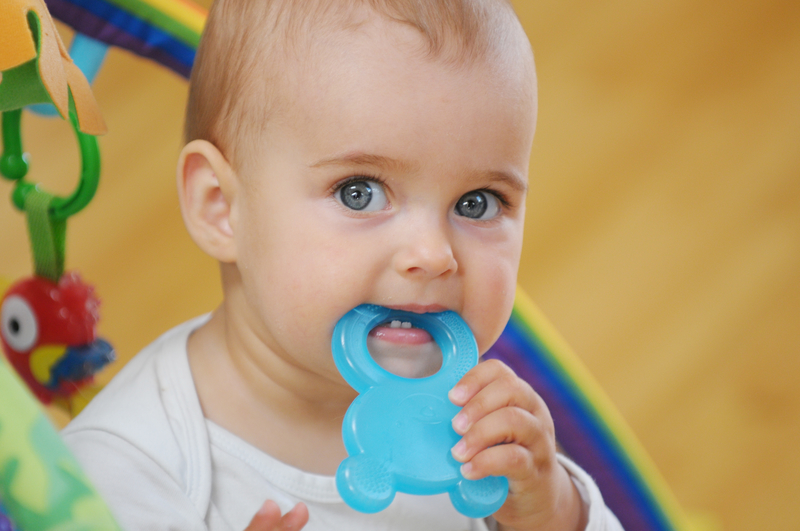What to Expect from a Teething Baby
Making Dental Visits Easy on Kids
February 26, 2018Sugar Guidelines for Children’s Teeth Health
March 15, 2018
Most babies begin teething between 4 and 7 months. However, depending on genetics, your baby could start sprouting teeth as little as 3 months old or after their first or second birthday. Teeth come into the mouth in a certain order, with the bottom two teeth usually being the first teeth. Several can come through at once or they can erupt in the mouth one at a time. It all depends on your baby. The American Academy of Pediatrics has signs to look for in your teething baby and ways to help them deal with the pain. Once that first tooth pops through, you want to visit the dentist within 6 months and you want to start an oral hygiene routine right away. We can help you know the signs of teething baby, what you can do to help them, and how to avoid tooth decay.
The First Tooth
Just like with all baby milestones, all of your baby’s teeth will come in at their own pace. However, we see that most babies start to have their first tooth between 4 and 9 months old. Some babies will get their first tooth after a year old and others will get the first tooth as early as 2 or 3 months old. It all depends on genetics. We do know that the teeth predictably come in about the same in every baby. The lower front teeth will generally come in first, followed by the upper front teeth. Then the next bottom 2 teeth will come in, followed by the top 2 next teeth. This process continues until your baby has 20 total baby teeth, with 10 in the upper jaw and 10 in the lower jaw.
A basic guideline for a teething baby is one such as this:
- 6 Months: Bottom two front teeth, which are the lower central incisors.
- 8 Months: Upper two front teeth, or the upper central incisors.
- 10 Months: The bottom two teeth next to the central bottom front teeth (lower lateral incisors). This is followed by the next two upper front teeth.
- 14 Months: The molars come in.
- 18 Months: The canines appear.
- 24 Months: Baby gets their second molars.
This timeline may be different in every baby. If your baby starts getting their teeth at 1 year, simply adjust this basic timeline. As soon as that first tooth pops through the gums, however, you want to start gently brushing it several times a day. You also want to wipe the baby’s gums after every feeding or time eating, as tooth decay can happen quickly in baby teeth.

Helping a Teething Baby
Getting teeth is an exciting and exhausting time for both infants and their parents. If you’ve had a child before, then you know that your usually happy baby can become very fussy for weeks or months while they are getting their teeth. It’s painful for a baby to have a hard tooth break through their gums! A teething baby can become irritable, may have trouble sleeping, will rub their face and their drooling increases. They may tug on their ears, bite, suck or chew on everything and may reject food and drink more than usual.
Having a teething baby means that you may be getting very little sleep on top of already not getting a ton of sleep. Here are a few tips that can help:
- Give you baby a teething ring to chew on. Some can be chilled to help sooth gums.
- Wet a washcloth, put it in a baggie and place in the fridge or freezer. They can chew on the washcloth (without the baggie) to ease discomfort and pain .
- Gently rub your baby’s gums with your fingers after washing your hands. This massaging helps some babies.
- If your baby is a bit older, they can use teething pain relievers such as Orajel liquids and gels for gums.
- Other medicine options such as baby Tylenol or baby ibuprofen can help too, but ask your doctor first.

Free Infant Dental Exam
Did you know that babies need to see the dentist too? The American Academy of Pediatric Dentistry recommends that children be seen for an exam as early as 1 year of age or within the first 6 months of their first tooth appearing. We want the best for your child and their oral health, which is why we offer a free first infant dental exam for our patients. This offer is good for children 18 months and younger. The first infant dental exam is very straightforward and easy. It is a time for us to check that the teeth are coming in well and a time for us to give you guidance for taking care of baby teeth.
We do this exam in a knee-to-knee position with Dr. Nam and the parent. Your baby can stay in the comfort and security of your lap while Dr. Nam quickly examines their mouth. The child will face the parent, with their legs wrapped around the parent’s waist, and we will gently lay their back on the dentist’s lap. While you hold them, Dr. Nam will gently examine your child’s mouth using a soft toothbrush and a mirror. This exam is very quick easy for your little one.
Healthy Teeth for Life
Just like everything else, babies need help with their oral health until they are old enough to care for their own teeth. We can help you keep their oral health in top shape and can provide you specific help with your teething baby. For all your questions about caring for your infant’s teeth or to schedule their first visit, call Hardy Pediatric Dentistry & Orthodontics at (720) 887-6003!